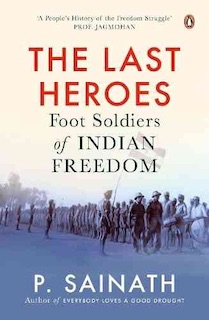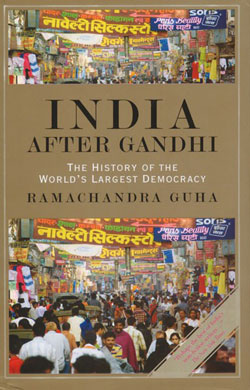The first report on minority rights, made public in late August 1947, provided for reservation for Untouchables only. Muslims were denied the right, which in the circumstances was to be expected. However, one member [of the Constituent Assembly of India] regretted that ‘the most needy, the most deserving group of adibasis [tribals] has been completely left out of the picture.’
The member was Jaipal Singh, himself an adivasi, albeit of a rather special kind. Jaipal was a Munda from Chotanagpur, the forested plateau of South Bihar peopled by numerous tribes all more-or-less distinct from caste Hindu society. Sent by missionaries to study in Oxford, he made a name there as a superb hockey player. He obtained a Blue, and went on to captain the Indian team that won the gold medal in the 1928 Olympic Games.
On his return to India Jaipal did not, as his sponsors hoped, preach the Gospel, but came to invent a kind of gospel of his own. This held that the tribals were the ‘original inhabitants’ of the subcontinent – hence the term ‘adibasi’ or ‘adivasi’, which means precisely that. Jaipal formed an Adibasi Mahasabha in 1938 which asked for a separate state of ‘Jharkhand’, to be carved out of Bihar. To the tribals of Chotanagpur, he was their marang gomke, or ‘great leader’. In the Constituent Assembly he came to represent the tribals not just of his native plateau, but of all India.
Jaipal was a gifted speaker, whose interventions both enlivened and entertained the House. (In this respect, the Church’s loss was unquestionably politic’s gain.) His first speech was made on 19 December 1946 when, in welcoming the Objectives Resolution, he provided a masterly summary of the adivasi case. […]
Source: India After Gandhi: The History of the World’s Largest Democracy by Ramachandra Guha (New Delhi: Picador India), p. 115
URL: https://worldcat.org/en/title/179807214
Ramachandra Guha, India After Gandhi: The History of the World’s Largest Democracy (p. 115) | More information and book review >>
Jaipal Singh Munda (January 3, 1903 – March 20, 1970) was a Munda tribal man, who captained the Indianfield hockey team to clinch gold in the 1928 Summer Olympics in Amsterdam. He is well known for his sportsmanship and political skills.
Later he emerged as a sole leader of Adivasi cause and creation of a separate home land for adivasis of central India. As a member of the Constituent Assembly of India he actively campaigned for the rights of the scheduled tribes.
His dream came true on November 15, 2000, when Jharkhand was carved out of Bihar.He is popularly known as “Marang Gomke”which means the Great Leader. This name was given to him by the tribal people of Chota nagpur region.
Source: Jaipal Singh – Wikipedia, the free encyclopedia
Address : https://en.wikipedia.org/wiki/Jaipal_Singh
Date Visited: Sat Jul 26 2014 19:36:54 GMT+0200 (CEST)
Published on Nov 30, 2013
Hockey The National Game of India. But due to negligence of people it’s now limited only to text books. Jharkhand is a State where Hockey is still treated as National Game has produced many international hockey Players including Jaipal singh Munda who was captain of the team which won the first Olympic Gold for India and Silvanus Dungdung who won the Last Olympic Gold for India.
Up-to-date reports by Indian journalists and commentators
To search Indian periodicals, magazines, web portals and other sources safely, click here. To find an Indian PhD thesis on a particular tribal community, region and related issues, click here >>
Search tips
Combine the name of any particular state, language or region with that of any tribal (Adivasi) community.
Add keywords of special interest (music, poetry, dance just as health, sacred grove and biodiversity); learn about the rights of Scheduled Tribes such as the “Forest Rights Act” (FRA); and the United Nations “Declaration on the Rights of Indigenous Peoples”, “Universal Declaration of Human Rights”, “women’s rights”, or “children’s right to education”.
Ask a question that includes “tribal” or “Adivasi”, for instance: “Adivasi way of life better?” (or “tribal way of life worse?”)
Specify any particular issue or news item (biodiversity, bonded labour and human trafficking, climate change, ecology, economic development, ethnobotany, ethnomedicine, global warming, hunter-gatherers in a particular region or state, prevention of rural poverty, water access).
For official figures include “scheduled tribe ST” along with a union state or region: e.g. “Chhattisgarh ST community”, “Himalayan tribe”, “Scheduled tribe Tamil Nadu census”, “ST Kerala census”, “Particularly Vulnerable Tribal Group Jharkhand”, “PVTG Rajasthan”, “Adivasi ST Kerala”, “Adibasi ST West Bengal” etc.
In case the Google Custom Search window is not displayed here try the following: (1) toggle between “Reader” and regular viewing; (2) in your browser’s Security settings select “Enable JavaScript” | More tips >>
Note: hyperlinks and quotes are meant for fact-checking and information purposes only | Disclaimer >>

Adivasi | Books | Publishers >>
History | Success stories >>
Learn more
Childhood | Childrens rights: UNICEF India | Safe search
Crafts and visual arts | Masks
Education and literacy | Right to education
eBook | Adivasi Stories from Gujarat
eBook | “Where the mind is without fear”: Tagore, Gitanjali and the Nobel Prize
Literature and bibliographies | Literature – fiction | Poetry
Tips for using interactive maps
Toggle to normal view (from reader view) should the interactive map not be displayed by your tablet, smartphone or pc browser
For details and hyperlinks click on the rectangular button (left on the map’s header)
Scroll and click on one of the markers for information of special interest
Explore India’s tribal cultural heritage with the help of another interactive map >>

